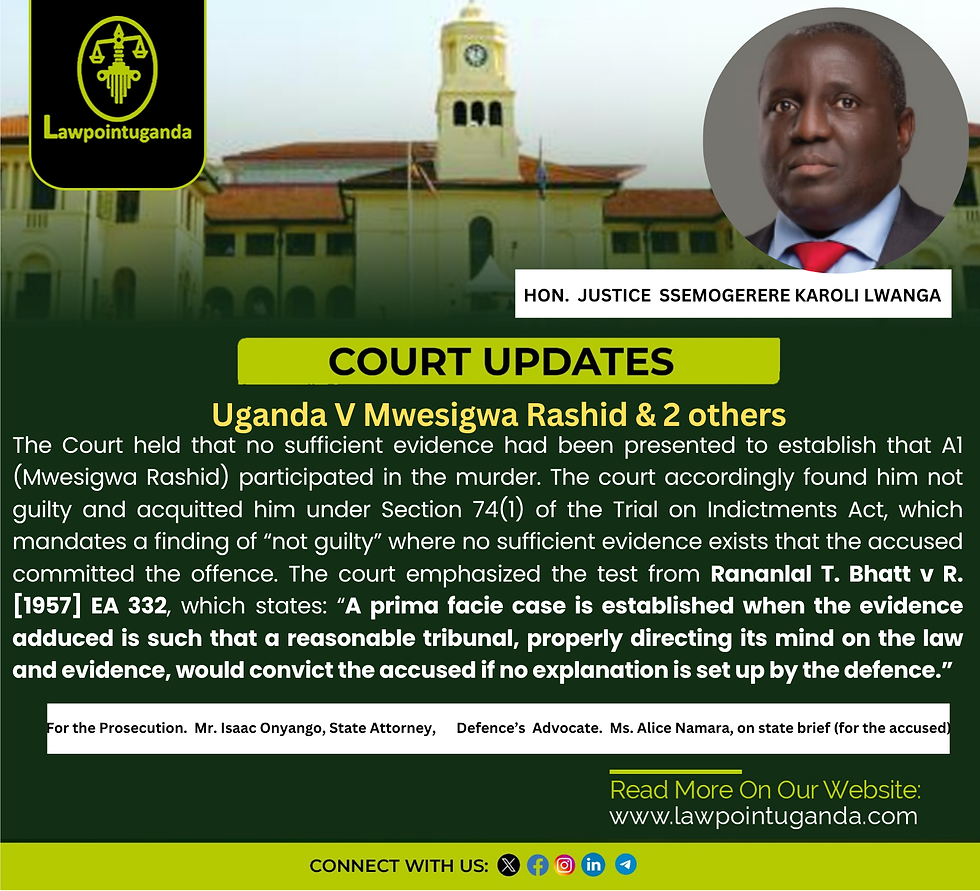Prolonged separation and failure to maintain or communicate constitute clear evidence of a marriage that has irretrievably broken down. Court at Mengo Affirms.
- Waboga David

- Nov 4, 2025
- 4 min read

🧾 Facts
The petitioner, Ntongo Musiitwa Rebecca, sought dissolution of her marriage with Kinene Nicholas, solemnized on 6th September 2014 at Miracle Centre Cathedral Rubaga under Ugandan law.The couple had three children:
Kinene Jordan Alpha (13 years),
Kinene Jireh Able (9 years), and
Kinene Jerusha Adonai (7 years).
The petitioner alleged that for over five years, the respondent deserted her and the children, abandoning all responsibilities, including maintenance, school fees, and accommodation. She averred that the marriage had irretrievably broken down.
The respondent admitted being away but claimed he had gone to Kenya to earn a living, sending money occasionally. He denied desertion and alleged doubts over the paternity of two of the children.
⚖️ Issues for Determination
Whether the marriage between the petitioner and the respondent should be dissolved.
Who is entitled to custody of the children of the marriage.
What remedies are available to the parties.
🧑⚖️ Legal Representation
Petitioner: M/s Kasumba, Kugonza & Co. Advocates
Respondent: Appeared pro se (self-represented)
📚 Submissions
Counsel for the petitioner relied on the ground of desertion under the Divorce Act and relevant jurisprudence.
The respondent had been away for over five years and failed to provide materially or emotionally for his family.
Citing Lang v Lang (1954) ALL ER 571, counsel submitted that desertion requires proof of two elements:
Factum deserendi (the physical act of leaving), and
Animus deserendi (the intention to permanently end cohabitation).
Counsel also relied on Kayhul v Kayhul (Divorce Cause No. 123 of 2016 [2020 UGHCFD]), emphasizing that desertion can occur even when spouses stay in the same house if one withdraws from the other for two years or more.
Counsel concluded that the respondent’s conduct met both elements, proving that the marriage had irretrievably broken down.
The respondent’s claim that he was in Kenya for work lacked credibility, as he admitted sending only UGX 10,000 every 3–4 months, which the court found grossly inadequate.
🏛️ Court’s Findings
On the Dissolution of Marriage
The court reaffirmed the equal applicability of grounds for divorce to both spouses, referencing Uganda Association of Women Lawyers (FIDA) & 5 Others v Attorney General (Constitutional Petition No. 2 of 2003) — which struck down discriminatory provisions of the Divorce Act and held that all grounds apply equally to men and women. Dr. Specioza Wandira Kazibwe v Eng. Charles Nsubuga Kazibwe (Divorce Cause No. 03/2003), Julius Chama v Specioza Rwalinda Mbabazi (Divorce Cause No. 25/2011)
Quoting from Black’s Law Dictionary (9th Ed., p. 211), the court restated that desertion entails:
“The willful and unjustified abandonment of a person’s duties or obligations, especially to a spouse or family.”
And citing Lang v Lang (1954) 3 ALL ER 571, the court reiterated:
“To establish desertion, two things must be proved: first certain outward and physical conduct – the factum deserendi – and secondly the animus deserendi – the intention underlying this conduct to bring the matrimonial union to an end.”
The court found that the respondent had physically left the matrimonial home and ceased cohabitation. His minimal financial contribution and total disengagement demonstrated intent to permanently end the union. The petitioner’s testimony was uncontroverted and corroborated by the respondent’s admissions.
Accordingly, the court held that the respondent’s desertion was proven and that the marriage had irretrievably broken down.
On Custody of the Children
The court applied Article 34 of the Constitution and Sections 3 and 4 of the Children Act, emphasizing that the best interests of the child are paramount.
The magistrate observed that:
The petitioner had solely provided for the children’s welfare.
The respondent had never paid school fees and refused a DNA test citing lack of funds.
The petitioner appeared responsible and stable, providing a nurturing environment.
The court thus found it in the best interests of the children that custody be granted to the petitioner.
On Remedies
Having proved the grounds for divorce, the petitioner was entitled to:
A decree nisi dissolving the marriage.
Custody of the three children.
Maintenance contribution of UGX 900,000 per term by the respondent for the children’s education.
Costs of the petition.
🧩 Holding
The court granted a decree nisi dissolving the marriage between Ntongo Musiitwa Rebecca and Kinene Nicholas, awarded custody of the three minor children to the petitioner, and ordered the respondent to contribute UGX 900,000 per school term towards tuition. Costs were also awarded to the petitioner.
💡 Key Takeaways
Equal Grounds for Divorce:
Following FIDA v Attorney General (2003), all statutory grounds for divorce apply equally to both spouses.
Proof of Desertion
Requires both factum deserendi (physical departure) and animus deserendi (intent to end cohabitation).
Irretrievable Breakdown
Prolonged separation and failure to maintain or communicate constitute clear evidence of a marriage that has irretrievably broken down.
Welfare Principle in Custody
The court prioritizes the child’s welfare and stability over parental preference or gender.
Practical Obligation
Even when divorce is granted, the non-custodial parent remains financially responsible for the children’s upkeep.





.jpg)

Comments